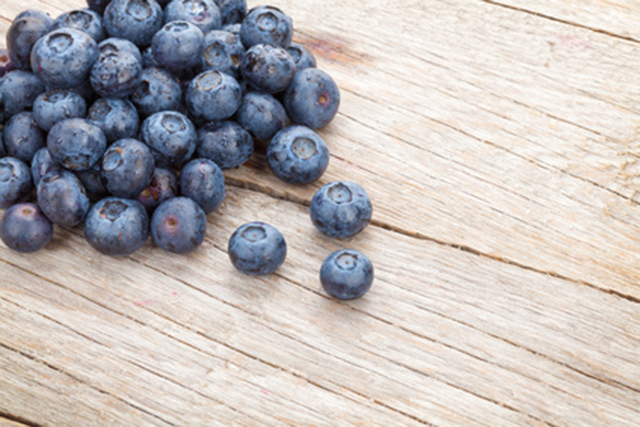Don’t let the size fool you; blueberries are powerful. These little gems are packed with health benefits and nutrients and there are many reasons to eat blueberries.
Popular from Asian to Mediterranean cuisines, blueberries provide great flavor, satisfying those sweet cravings.
Let’s take a look at 10 reasons to eat blueberries.
1. Anti-inflammatory properties:
Blueberries are extremely rich in antioxidants, which have anti-inflammatory benefits. Chronic inflammation is considered a major risk factor for serious disease, including cancers and heart disease. Blueberries help reverse this inflammation. The anti-inflammatory properties of blueberries have been confirmed by clinical research, including a recent study from the University of Eastern Finland.
2. Antioxidant rich:
Blueberries are one of the richest food sources of antioxidants in the world, so it is not surprising at all how many health benefits they provide. Antioxidants promote overall health by fighting the effects of oxidative stress. According to Dr. Andrew Weil, “Oxidative stress is the total burden placed on organisms by the constant production of free radicals in the normal course of metabolism plus whatever other pressures the environment brings to bear (natural and artificial radiation, toxins in air, food and water; and miscellaneous sources of oxidizing activity, such as tobacco smoke).” The effects of oxidative stress are often linked to chronic illnesses such as heart disease and many types of cancers.
3. Blood sugar:
Research has been conducted on the effects of blueberries for persons with type 2 diabetes, insulin resistance, and metabolic syndrome. They are a low glycemic index fruit, which means it doesn’t place a high load on blood sugar. According the American Diabetes Association, “the glycemic index, or GI, measures how a carbohydrate-containing food raises blood glucose.” The participants in the study showed great improvement in blood sugar regulation after three months. Blueberries contain dietary fiber, which is also important for blood sugar regulation.
4. Brain health:
Can eating blueberries keep your brain sharp and healthy? Studies say yes. Harvard researchers conducted a study, which showed that consuming berries that are high in flavonoids like strawberries and blueberries delayed memory decline in older women. Elizabeth Devore, an instructor in medicine at Harvard noted, “our findings have significant public health implications as increasing berry intake is a fairly simple dietary modification to reduce memory decline in older adults.”
5. Digestive health:
Blueberries are rich in dietary fiber, with 14% of the recommended daily value per cup. Dietary fiber is key for digestive health, as it prevents constipation and promotes overall health of the digestive tract.
6. Heart health:
The heart thrives on antioxidants, which makes blueberries a top heart health food. Blueberries have been shown to reduce levels of LDL cholesterol (bad cholesterol) in the blood, which is very important for heart health. According to the American Heart Association, high cholesterol is one of the major factors for heart disease, stroke, and atherosclerosis.
7. Lower blood pressure:
High blood pressure is a serious condition. According to the American Heart Association, high blood pressure can cause damage to the arteries, stroke, kidney damage, memory loss, and much more. A study published in the journal Plos One showed that eating blueberries can reduce high blood pressure.
8. May fight cancer:
Blueberries are high in dietary fiber, which is believed to help prevent cancers of the digestive tract. They also contain a variety of antioxidants and nutrients like vitamin C, ellagic acid, anthocyanins, urolithins, and pterostilbene, which according to the American Institute for Cancer Research (AICR) may help prevent certain types of cancers. Studies on animals have shown anti-cancer benefits for these antioxidants. Most studies in humans are focused on the overall level of fruit consumption. According to AICR, “comparing people with and without cancer, the studies show lower risk of several cancers in those who eat more fruits compared to those who eat relatively few.”
9. Rich in vitamin C:
Blueberries are a great source of vitamin C, with 14.4mg per cup, which is about 24% of the recommended daily value. There isn’t much to say about vitamin C that hasn’t been said already. Vitamin C has been known for generations as a potent immune booster and antioxidant. According to MayoClinic, “Vitamin C (ascorbic acid) is a water-soluble vitamin, which is needed by the body to form collagen in bones, cartilage, muscle, and blood vessels, and which aids in the absorption of iron.” Vitamin C must be added to the diet every day, because the body doesn’t store it.
10. Weight loss:
Since blueberries are such a great source of dietary fiber, they are beneficial for weight loss. Foods that are high in fiber increase satiety, meaning you feel full faster, so you eat less.
Note: None of the information in our website is intended to diagnose, treat, cure or prevent any illness or disease. The content on our website is for educational purposes only.
For a blackberry immune booster smoothie.
Health benefits of blueberries.
For a raspberry and mint infused water.
REFERENCES:
1. “Wild Blueberries (Vaccinium Myrtillus) Alleviate Inflammation and Hypertension Associated with Developing Obesity in Mice Fed with a High-Fat Diet.” PLOS One. PLOS One, 12 Dec. 2014. Web. 27 Apr. 2015.
2. “Anti-diabetic Properties of the Canadian Lowbush Blueberry Vaccinium Angustifolium Ait.” National Center for Biotechnology Information. Phytomedicine, Nov. 2006. Web. 27 Apr. 2015.
3. “Why Blood Pressure Matters.” American Heart Association. American Heart Association, n.d. Web. 27 Apr. 2015.
4. “AICR’s Foods That Fight Cancer™.” American Institute for Cancer Research. American Institute for Cancer Research, n.d. Web. 27 Apr. 2015.
5. “Nutrition Facts and Analysis for Blueberries, Raw.” Self Nutrition Data. Self Nutrition Data, n.d. Web. 27 Apr. 2015.
6. “Vitamin C (ascorbic Acid).” Mayo Clinic. Mayo Clinic, n.d. Web. 27 Apr. 2015.

















